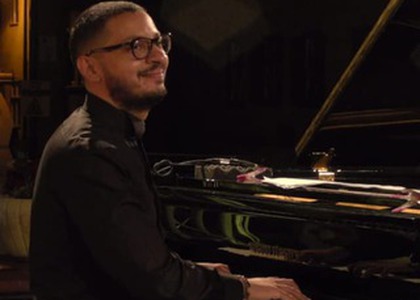> [Archived] Interviews

Interview with pianist Cătălin Răducanu
"An artist, a piano and a cymbal" is the title of Cătălin Răducanu's tour, which began in August and has so far included ten recitals. The young artist talks to Ioana Țintea about the recital he will give on the 24th of October at the Romanian Athenaeum.
Cătălin Răducanu, first of all I would like to ask you to tell us how the project "An artist, a piano and a cymbal" was born.
This project was born unexpectedly. Somehow... I woke up with it, but it was an incredible surprise and it came at the right time in my career.
What were the criteria you used to select the work?
The criteria was to be as contrasting as possible, primarily diverse and versatile. And, at the same time, no elitist repertoire as if I were playing a classical music piano recital, as I have been used to for so many years.
Are there particular techniques you use when improvising?
I am a classical pianist and have played jazz in my life, but this area I have not studied as deeply as I have studied classical music. I just have to admit that I have the necessary predispositions and latent forces that have become active over time with regard to jazz. I let myself be inspired by the moment, I follow the structures of the respective jazz pieces that I play and build on them certain melodies, certain formulas. I usually speculate a lot on the rhythm or, as I said, the melody, or the harmonic plan... I like to play with harmonies quite a lot.
So it all happens organically!
Exactly! That's exactly what I want. Not to have some formulae already predetermined and just put it there to sound good. No. I even often prefer something that sounds slightly "cah", although in jazz there isn't much of that, because you can make something brilliant out of an accident. I think it's much more valid for an improviser to just go with what they're doing in the moment, to not want everything to be planned. And if a little accident happens, that's what I find interesting, to know how to solve it in such a way that it becomes an artistic gem.
How would you describe the reaction of the audience that has attended your recitals so far to this combination of instruments - piano and cymbal?
The simplest and truest answer is that they reacted extraordinarily well, they were enthusiastic, and it was precisely the combination of these instruments that fascinated them so much.
On the 24th of October you will play at the Romanian Athenaeum. What is the atmosphere you want to create and what thoughts should the audience come with?
They should try to feel and be guided by the sounds of classical music. A repertoire, in my opinion, very accessible, but at the same time a reference for the piano repertoire. And simply to get into the game of music and styles and diversity... classical, jazz, folk. I even have a composition of my own that I'm going to play on the cymbal and a piece by Erik Satie, Gnossienne, my own arrangement for the cymbal, because it seems to me that it fits very well on the timbre of this instrument.
Translated by Bianca Daniela Penaru,
University of Bucharest, Faculty of Foreign Languages and Literatures, MTTLC, year I
Corrected by Silvia Petrescu














